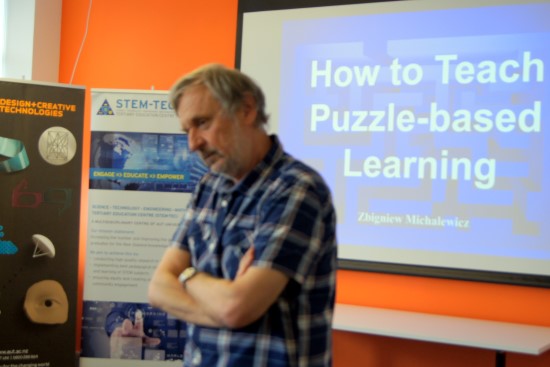3-6 November 2014: Series of four seminars by Professor Zbigniew Michalewicz, University of Adelaide, Australia
3 November, Seminar 1: Puzzle-Based Learning Methodology. The talk addresses a gap in the educational curriculum by discussing a course that aims at getting students to think about how to frame and solve unstructured problems. The talk makes an argument that this approach – called Puzzle-Based Learning – is very effective for enhancing students' creativity, problem-solving and critical thinking skills especially those studying STEM subjects.
PowerPoint slides of seminar 1
4 November, Seminar 2: How to Teach Puzzle-Based Learning. Given the novelty of Puzzle-Based Learning approach a key question one would often get is: How to teach Puzzle-Based Learning? Are there any general teaching strategies of Puzzle-Based Learning? Are there any special class activities that can be incorporated into Puzzle-Based Learning courses? How to organize the material in the most meaningful way? What about effective assessment? Is there any merit in peer teaching of this course? Which puzzles should be selected as warm-up exercises? Those and other questions will be discussed in the talk.
PowerPoint slides of seminar 2
5 November, Seminar 3: Academia and Entrepreneurship: How to Start and Run a Technology Company. The process of building a business "from rags to riches" is never easy, but there are many tips and techniques that can be used to smooth some of the bumps in the road. During the talk we would discuss many of such tips and techniques that are often lost among the myriad of issues that emerge during the journey of growing business. The fundamental question we would address is "What should I do to make people believe in my business?"
PowerPoint slides of seminar 3
6 November, Seminar 4: Evolutionary Computation for Real-World Applications. I will provide my personal perspectives on a few important issues, e.g. What are the practical contributions coming from the theory of Evolutionary Algorithms? Did we manage to close the gap between the theory and practice? How do Evolutionary Algorithms compare with Operation Research methods in real-world applications? Why do so few papers on Evolutionary Algorithms describe real-world applications? For what type of problems are Evolutionary Algorithms "the best" method?
PowerPoint slides of seminar 4
About the Speaker. Professor Zbigniew Michalewicz was working at Computer Science Departments at the Victoria University of Wellington (1982-1988), University of North Carolina (1988-2004), and University of Adelaide (since 2004). He is the author of more than 250 publications including 26 books. He is internationally recognised as a creator and promoter of puzzle-based learning methodology (http://www.puzzlebasedlearning.edu.au/) through his books "Puzzle-Based Learning: An introduction to critical thinking, mathematics, and problem solving" and "A Guide to Teaching Puzzle-based Learning". Zbigniew has secured numerous multi-million dollar industry contracts from companies such as General Motors, Ford Motor Company, Bank of America, and U.S. Department of Defence. His scientific and business achievements have been recognized by many invited talks and publications, including TIME Magazine, Newsweek, New York Times, Forbes, Business Journal, and the Associated Press. He was a co-founder and Chief Scientific Officer of SolveIT Software, a supply chain optimisation business he grew from zero to 180 employees and $20 million in revenue before selling the business to Schneider Electric. SolveIT Software became the 3rd fastest-growing company in Australia in 2012, as ranked by Deloitte. In 2014 he co-founded a new company, Complexica. The company is currently in R&D mode working with foundation customers to develop next generation applications for cognitive computing.
Professor Zbigniew Michalewicz at his talk at the STEM-TEC Centre seminar on 4 November 2014
Email:
